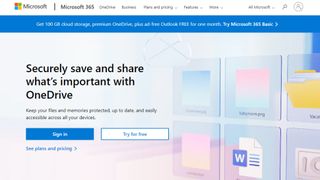Best secure file hosting of 2024
Host files securely in the cloud with these superb services
The best secure file hosting makes it simple and easy to protect your personal information or sensitive data.

1. Best overall
2. Best affordable
3. Best for security
4. Best for syncing
5. Best for Apple users
6. Best free option
7. Best for storage
8. Best for flexible working
9. FAQs
10. How we test
The web is not short of sites where you can host files and folders, but not all of them are particularly secure. And if you’re hosting personal information, sensitive data, or important work material, then it’s worth taking extra time to find a provider who can offer proper protection.
We’ve discovered eight of the best here – if you use any of these options you can be sure that your information will be thoroughly protected.
And, beyond that, we’ve explored the features on offer by these eight providers. Some have fantastic mobile apps, others have in-depth collaboration features and you can find file hosting providers that offer other business services as well.
It’s important to weigh up each service before you spend any cash, but you won’t go far wrong with any of these options – they’re all excellent and all secure. If you need more storage solutions, don’t look too far either: we’ve also picked out the best cloud storage providers and best cloud backup services, too.
The best secure file hosting of 2024 in full:
Why you can trust TechRadar
Best overall

Reasons to buy
Reasons to avoid
Launched in New Zealand by Kim Dotcom in 2013, MEGA currently has more than 160 million registered users across the globe. It offers end-to-end encrypted service with both free and paid accounts.
End-to-end, zero-knowledge AES 128-bit encryption protects everything that’s uploaded to the service, with recovery keys and two-factor authentication (2FA) deployed too, and file versioning protects against ransomware attacks.
Those security measures protect chats and files hosted on the service, and robust privacy features sit alongside the encryption and security abilities to ensure total security and anonymity.
Elsewhere, MEGA offers fast and reliable storage and transfers, apps for mobile and desktop devices, impressive transparency, and free accounts that provide 20GB of storage. Individual account pricing starts from around $5 per month and delivers loads of extra storage and transfer capacity, and business accounts have additional collaboration utilities and higher capacities.
Read our full MEGA review.
Best affordable

Reasons to buy
Reasons to avoid
4Shared is perfect for photo albums, music, video, and documents. A free account here will net you an impressive 15GB of space with a 2GB file upload limit, and 128-bit encryption protects account information. Regular backups and secure data centers keep uploads safe, and 4Shared runs regular antivirus checks.
That’s a good start, but we recommend using 4Shared’s paid options if you want to make the most out of this product. You’ll get 100GB of space and a 100GB file upload limit alongside download acceleration, detailed file and account statistics, FTP access, and more robust backup features. This tier costs $10 per month, so it’s not expensive either.
4Shared is an effective choice if you need loads of space without spending loads of cash – and it’s got some pleasing technical features, too.
Read the full 4Shared review.
Best for security

Reasons to buy
Reasons to avoid
SpiderOak is one of the most robust file hosting providers you’ll find anywhere – because security and privacy are at the forefront of all the company’s products.
The company’s One Backup service offers enterprise-level data protection for anything you choose to upload – whether it’s personal files or corporate data. End-to-end encryption protects files, and the company has no knowledge of your data or account. Files are shared securely using temporary and self-destructing links, and point in time recovery saves files if you’re subjected to a ransomware attack.
This secure approach is evident on SpiderOak’s other products. Crossclave is a collaboration tool that deploys all those security features in an environment where people can work together, including in chats and video calls, and OrbitSecure offers cybersecurity for space-based organizations.
These are undoubtedly serious products, but it’s impossible to fault SpiderOak’s superb security measures. It doesn’t have to be expensive, either: if you’d like to try One Backup, there’s a 21-day free trial.
Read the full SpiderOak One Backup review.
Best for syncing

Reasons to buy
Reasons to avoid
Everyone’s heard of Google and virtually every person with a smartphone or computer has access to Google Drive, but the search giant hasn’t been complacent when it comes to security.
Anything that’s uploaded to Google Drive is encrypted using 256-bit SSL/TLS encryption, and two-factor authentication guards your files. Files are backed up in Google’s data centers, too, and extensive sharing options mean that you can maintain control over your information.
You’ll get a solid 15GB of storage without spending a penny on Google Drive, and the straightforward interface makes it easy to upload, store and share files. It’s not expensive to upgrade, either: you can get 100GB of space by spending a couple of dollars per month and get added discounts and Android VPN access if you opt for higher tiers.
There’s one catch: when you upload files to Google, they’re decrypted and scanned before being re-encrypted. That’s enough to put plenty of people off, but Google still supplies relatively secure file hosting that will satisfy most users.
Read the full Google Drive review.
Best for Apple users

Reasons to buy
Reasons to avoid
Apple’s built-in storage service provides 5GB of free storage, and Cupertino’s cloud-based system has good security features. Data is encrypted with TLS 1.2 encryption when in transit and it’s stored on iCloud in an 128-bit AES encrypted format, and you can only access the data when you’ve logged in with your Apple ID.
Apple’s end-to-end encryption also enforces two-factor authentication, and additional security measures protect health data.
It’s pleasing to see iCloud with such robust security in place – after all, it can backup everything that’s stored on your devices. And, beyond security, the service is easy to use for Apple users. It’s straightforward, intuitive, and very secure.
Read the full Apple iCloud review.
Best free option

6. WeTransfer
Reasons to buy
Reasons to avoid
WeTransfer is one of the most popular websites around for hosting and sharing files, especially if you want a one-off file sharing service rather than a full account. With so many people coming and going on this service, it’s important for security to be tight.
To that end, WeTransfer uses TLS encryption for file transfers and super-strong AES 256-bit encryption to store files. Data is only accessible with unique links that are provided to the server and recipient.
WeTransfer’s free product allows 2GB file transfers, and paid options are available if you need a service that you can regularly use to store and send data.
The Pro option grants each user 1TB of storage and 200GB file transfers – and improves security thanks to password-protected transfers. There’s a Premium option, too, that adds unlimited storage and better collaboration tools.
Best for storage

Reasons to buy
Reasons to avoid
Microsoft’s cloud storage service has been around since 2007, and the computing giant has developed a particularly robust approach to file security.
As usual, TLS encryption protects data during transit and 256-bit AES encryption takes over when data reaches Microsoft’s servers. Two-factor authentication is standard, and the service only allows authenticated connections with HTTPS. Only authorized engineers can access Microsoft’s data centers, and real-time security systems protect all of OneDrive’s facilities.
Networks and identities on OneDrive are isolated from the rest of Microsoft’s networks, and any data stored on OneDrive’s servers is backed up to at least two different locations in different global regions. OneDrive uses virus scanning, ransomware detection and version histories, too.
Impressively, you’ll get access to most of these features alongside 5GB of storage if you use OneDrive’s free plan, and paid options deploy more storage space and access to Microsoft Office apps. If you’re a business, OneDrive’s various access tiers supply services like Exchange, SharePoint and Teams alongside extra collaboration and sharing features.
Read the full Microsoft OneDrive review.
Best for flexible working

Reasons to buy
Reasons to avoid
Dropbox was one of the first companies to go big on cloud storage and file hosting, so it’s no surprise that it also has excellent security.
As with most other services, data is encrypted using TLS and SSL protocols while it’s being transported and with 256-Bit AES encryption when it arrives at the firm’s data centers.
Dropbox’s password manager, PIN-protected file vault and two-factor authentication add layers of security, and extensive file version history options mean you can easily recover files. You can remotely wipe devices if they’re lost or stolen, and business customers benefit from trusted content controls, enterprise-grade security management and adaptive infrastructure controls.
If you upgrade to certain business accounts you get HIPAA compliance, device approvals and API access, too, so it’s easier to maintain effective security and integrate Dropbox into your business.
Individuals can use Dropbox and its robust security features for free, albeit with limited storage capacities and access to features, and its Plus and Family options unlock all of the extra functionality for reasonable prices.
Read the full Dropbox review.
We've also highlighted the best secure file transfer solutions.
FAQs
Choosing the best secure file hosting service
Hosting your files online is the trend nowadays. There is no need to keep physical storage for your documents if there is a better way for file safekeeping. File hosting is easy and convenient. It is safe and secure. It also usually comes with file sharing and several features, so collaborating on projects is made easier while still well-protected.
While you can set up your own software and manage your own remote server for keeping your files, the option to utilize a file hosting service comes with numerous benefits. You can upload your files to a cloud-based storage system. You do not have to think about the storage system and deal with its upkeep. All you need to do is move the files to the storage managed by the provider, and everything works as it is supposed to.
In addition, you can download the service app on any of your devices, and all your files are synced automatically across all your systems. You also get to manage the sharing options and permissions for your files and folders, so you still have the authority to control your files’ privacy.
Which secure file hosting is best for you?
When deciding which secure file hosting to download and use, first consider what your actual needs are, as sometimes free and budget software options may only provide basic options, so if you need to use advanced tools you may find a paid platform is much more worthwhile. Additionally, higher-end software can really cater for every need, so do ensure you have a good idea of which features you think you may require.
How we test
To test for the best secure file hosting we first set up an account with the relevant online service. We then tested the service to see how the file hosting service could be used for different purposes and in different situations, such as when using large files and different devices. The aim was to push each service to see how useful its basic tools were and also how easy it was to get to grips with any more advanced tools.
Read how we test, rate, and review products on TechRadar.
Get in touch
- Want to find out about commercial or marketing opportunities? Click here
- Out of date info, errors, complaints or broken links? Give us a nudge
- Got a suggestion for a product or service provider? Message us directly
- You've reached the end of the page. Jump back up to the top ^
Are you a pro? Subscribe to our newsletter
Sign up to the TechRadar Pro newsletter to get all the top news, opinion, features and guidance your business needs to succeed!
Mike has worked as a technology journalist for more than a decade and has written for most of the UK’s big technology titles alongside numerous global outlets. He loves PCs, laptops and any new hardware, and covers everything from the latest business trends to high-end gaming gear.
